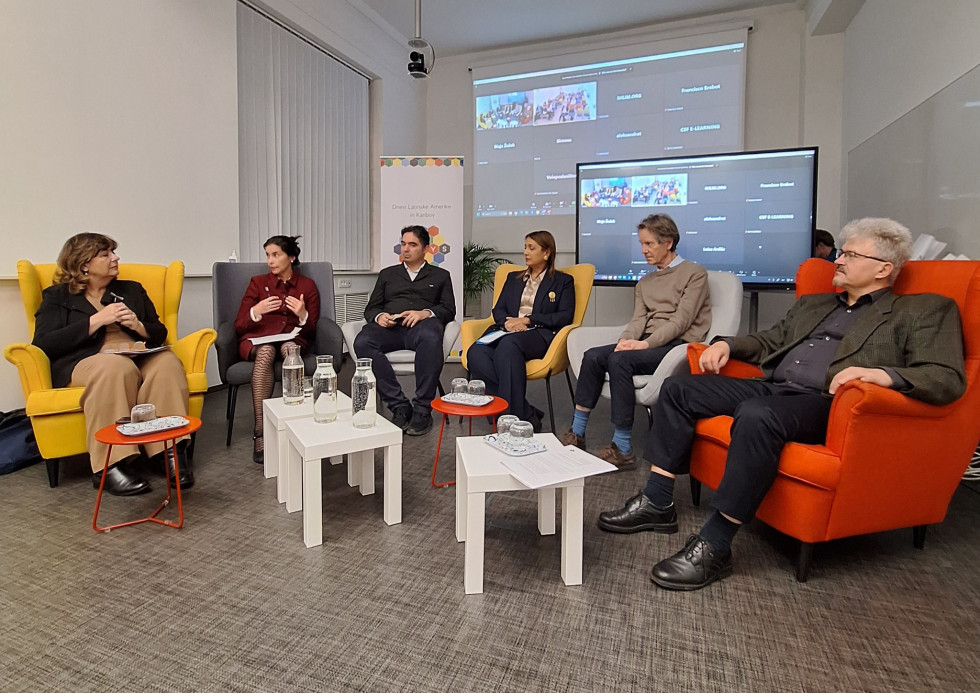Artificial intelligence and feminist foreign policy on the agenda at LAC Days 2023

Panel on artificial intelligence | Author Ministrstvo za zunanje in evropske zadeve
At the Chamber of Commerce and Industry of Slovenia, representatives of the Chamber, SPIRIT and individual sectoral associations presented the business environment in Slovenia and outlined the current cooperation between Slovenia and LAC countries. Slobodan Šešum, Director-General of the Directorate for Economic and Public Diplomacy at the Ministry of Foreign and European Affairs (MFEA), stressed the importance of cooperation between countries at the political level and announced the continuation of the mechanism of joint economic commissions with individual countries. He highlighted the benefits of business delegations taking part in bilateral visits. In a brief discussion, the participants agreed that there are many untapped opportunities for cooperation between Slovenia and the Latin America and Caribbean region. Both speakers and participants agreed that this cooperation will be strengthened in the future.
The Centre for Excellence in Finance hosted the afternoon panels on artificial intelligence and feminist foreign policy (FFP). The panel on FFP opened with a video address by Tanja Fajon, Minister of Foreign and European Affairs: "I firmly believe that by strategically addressing the structural barriers to gender equality, positive and lasting change can be achieved, not only for women and girls, but also for society as a whole". She added that the priorities of Slovenia's foreign policy are to make further progress on gender equality, the protection of women's rights and the empowerment of women. To this end, the MFEA is developing a national feminist foreign policy strategy. The panel, which included FFP ambassadors and representatives from the foreign ministries of Argentina, Colombia and the Netherlands, as well as the presidents of the EU-LAC Foundation and the Foundation for Studies and Research on Women (FEIM), discussed the main challenges in developing national feminist foreign policies and presented some good practices.
Panellists from Panama, Chile, the UNESCO International Research Centre on Artificial Intelligence (IRCAI) and Slovenia, who discussed AI, agreed that a debate on international norms and standards is needed. The EU and the Latin America and Caribbean region are ideally placed to strengthen dialogue and cooperation in the field of AI and digitalisation. They discussed best practices and shared lessons learned for other countries to follow. Participants were also introduced to the work of the IRCAI and the activities of the Bled Strategy Forum.
The Biotechnical Faculty hosted the scientific research part of the programme, which focused on sustainable forestry and irrigation, and presented a pilot project to improve the forest sector's capacity to work with local communities in Guyana. The participants were welcomed by Acting Director-General of the Science Directorate of the Ministry of Higher Education, Science and Innovation, Tomaž Boh.
The programme closed with a speech by Suzana Češarek, Deputy Director-General for Political Affairs at the Ministry of Foreign and European Affairs.
The LAC 2023 Days, held for the fifth time under the auspices of the MFEA in partnership with the Bled Strategic Forum, brought together Slovenian decision-makers, business people and foreign guests from Latin America and the Caribbean.
Following the conclusion of the LAC Days, the MFEA hosted a meeting of the 61-member Board of Governors of the EU-LAC Foundation on Friday 24 November. In her opening remarks, the Secretary-General of the Ministry, Ambassador Renata Cvelbar Bek, highlighted the excellent cooperation Slovenia has enjoyed over the years with the Foundation, which is an important actor in deepening cooperation between the EU and Latin America and the Caribbean. Effective partnerships are key to achieving successful outcomes. Slovenia is committed to further strengthening sectoral cooperation in areas that have already been at the forefront, such as the environment, water management, forestry, the circular economy, digitalisation and artificial intelligence.
